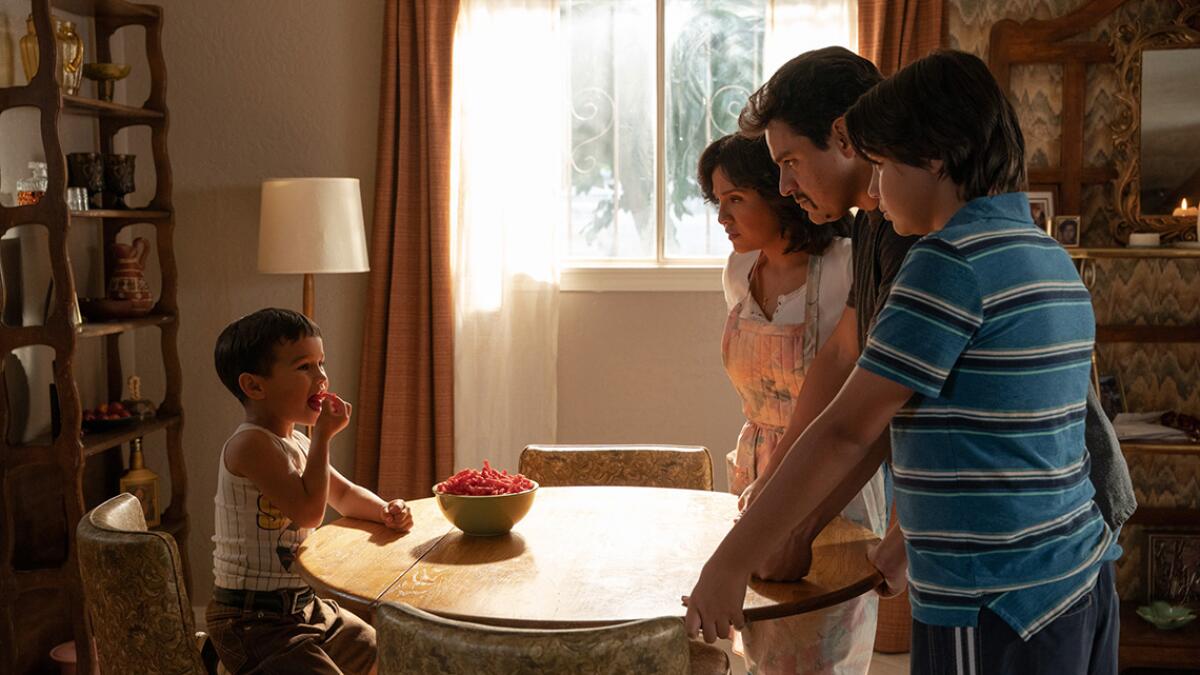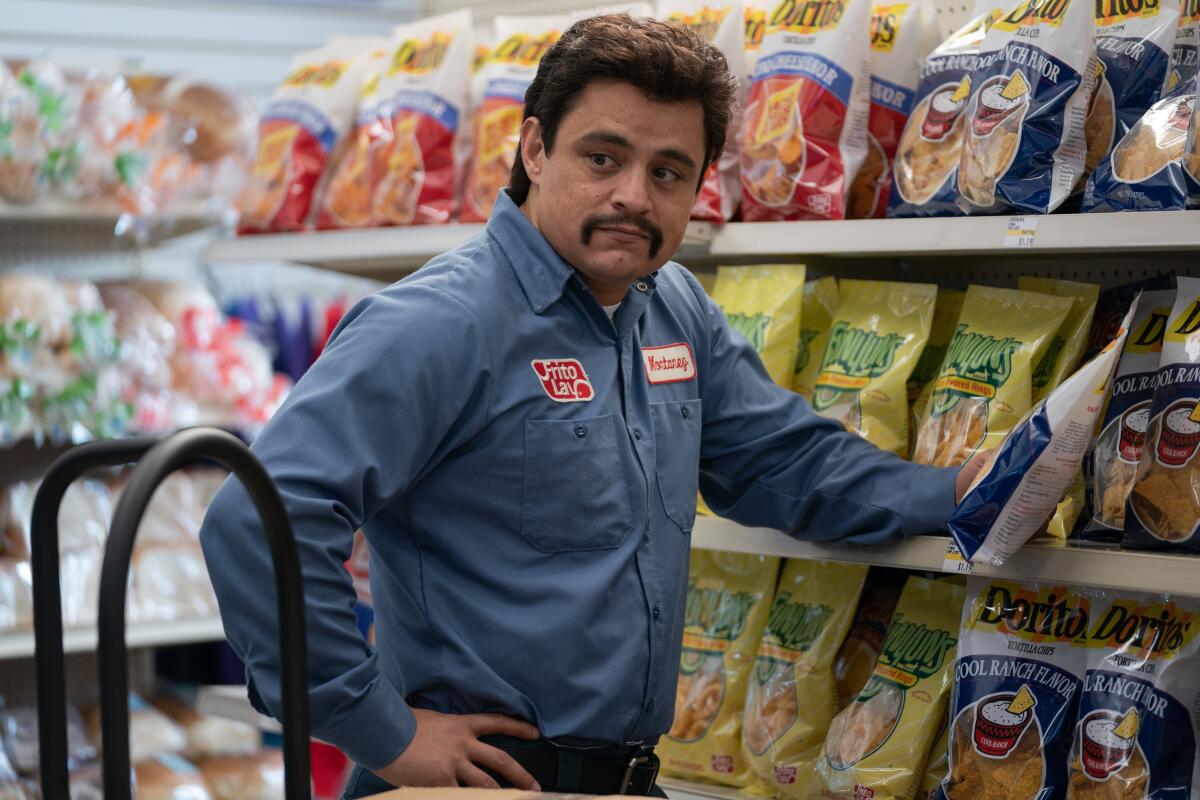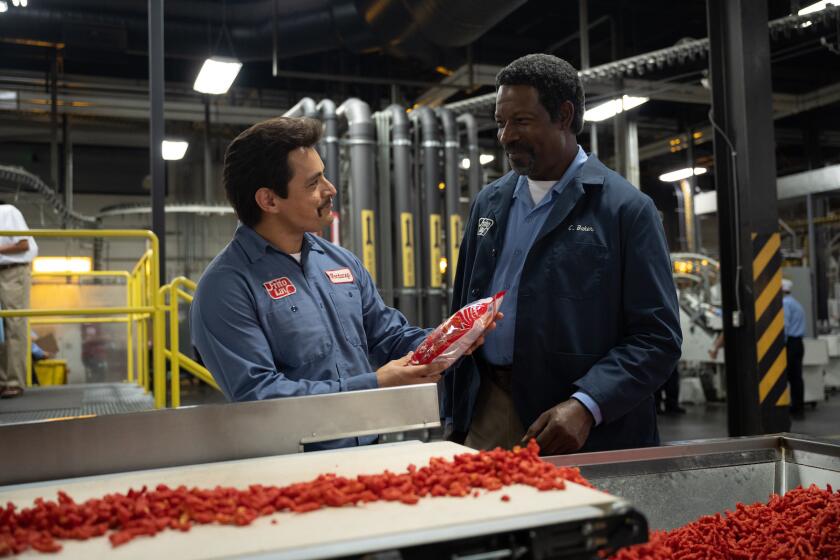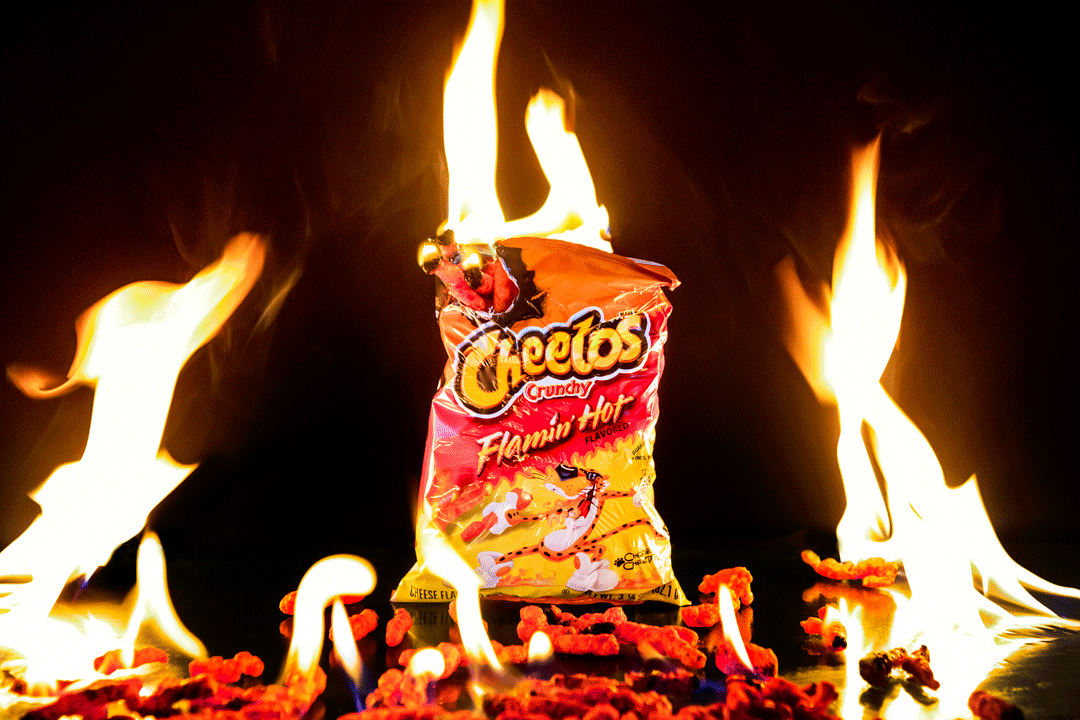Column: Why the Flamin’ Hot Cheetos movie is both pandering and pernicious

- Share via
I initially had no plans to see “Flamin’ Hot,” the film directed by Eva Longoria that tells the story of real-life-janitor-turned-Frito-Lay-executive Richard Montañez.
For at least 20 years, the Mexican American has told anyone within hearing distance that he invented the wildly popular Cheetos variety of the same name. The self-proclaimed “godfather of Latino marketing” taught corporate America that it could make billions of dollars off his community — and Latinos willingly forked over that cash because they finally felt seen.
He repeated this origin story to the point that the media — myself included — cited it without question. When my colleague Sam Dean published an article in 2021 proving that Montañez was a fibber at best and a fabulist at worst, Hot Cheetos lovers accused the Los Angeles Times of trying to take down their guy — about the only time you’ll see leftists defend a Fortune 500 bigwig.
Two years later, Longoria — who was already planning “Flamin’ Hot” when Dean’s article appeared — is still sore about the whole affair. In an interview the superstar did with the paper earlier this spring, she dismissed Dean’s reporting by snickering, “[It] feels like L.A. Times would have better resources dedicated to more important things.”
So, yeah, why would I want to stream Longoria’s movie?
Because Latinos better than me say I should.
Eva Longoria’s feature directing debut has a talented cast in an enjoyable crowd-pleaser based on Richard Montañez’s claims of creating Flamin’ Hot Cheetos.
The National Hispanic Media Coalition, which has righteously called out anti-Latino bias in Hollywood and the national media for decades, sent out a news release urging people to see “Flamin’ Hot.” LA Plaza de Cultura y Artes in downtown hosted a packed outdoor screening earlier this month attended by Longoria, Montañez and Dolores Huerta. Friends of mine who believed Dean’s findings nevertheless posted on social media that they saw “Flamin’ Hot” and enjoyed it.
I get the widespread call to support the film, which was released Friday on Hulu and Disney+. There aren’t enough Hollywood projects with Latinos in starring roles in front of and behind the camera, so we should at least think about showing up for the few that bubble up. As I wrote in a column defending Dean’s findings, “[Latinos are] invested in those who do rise up to levels we can only hope to achieve. After all, we’re still outsiders in the United States despite our numbers, our centuries of living here.”
So this past weekend, I streamed “Flamin’ Hot.” It’s just like its namesake: snackable, though nowhere near as good as fans attest and far more problematic than they’ll ever admit.

Jesse Garcia plays Montañez as a nice guy, toiling as a janitor, who doesn’t let obstacles — an abusive father, a dalliance with drug dealing, a racist society, skeptical bosses — get in the way of his dreams. Veteran actors Dennis Haysbert and Tony Shalhoub nail their roles as the Rancho Cucamonga plant engineer who gave Montañez the breaks he needed and the PepsiCo CEO who allegedly OKd his Flamin’ Hot dreams.
Longoria does a decent job as a first-time director, in some respects. You care about her characters, the plot easily unfolds over a brisk 99 minutes, and the cinematography is warm and comforting. She nevertheless throws away all the good in the film by blindly buying Montañez’s pitch: not just as the inventor of Hot Cheetos but as someone who should be hailed as a Latino hero.
From the mariachi yelps that punctuate the 20th Century Studios fanfare before “Flamin’ Hot” even begins to the vintage truck that Garcia’s Montañez drives at the end, Longoria glops on the mexicanidad. Spanish guitars, congas and mariachi horns blare throughout the film. White characters are mostly buffoons with no redeeming value. Beloved Chicano songs such as “Cutie Pie,” “No Tengo Dinero” and “Mexican Power” get trotted out as proof that Hollywood finally gets Latinos. Lines such as “The Hispanic market will not be ignored” and “We’re going to get [Hot Cheetos] out to our people” are tossed in to guarantee applause and whoops from viewers.
The frustration over Sam Dean’s article isn’t so much about Richard Montañez rather than a microcosm of two big issues that continue to plague Mexicans in the U.S.: historical erasure, and the continued yearning for heroes that white America can also embrace.
Actual history, of course, is an afterthought. The film states that Montañez came up with the idea for Hot Cheetos in 1992, even though Dean’s article showed that was the year the snack made its debut nationwide after successful test runs in Texas and the Midwest. A key point Montañez tells in one of his two memoirs — how he plugged into Tupperware parties in Southern California to spread the gospel of Hot Cheetos — is retold as a lowrider escapade that plays like a hidden level of “Grand Theft Auto.”
Dean’s story didn’t discount the arc of Montañez’s life — he really was a high school dropout from Ontario who rose through the ranks of Frito-Lay and now travels the country to speak about his unlikely rise. He just didn’t invent Flamin’ Hot Cheetos — others at Frito-Lay did.
But the details of history don’t matter to Longoria; Mexican pride does. “Flamin’ Hot” is the type of feel-good treacle that high school teachers screened for their Mexican American students when I was coming of age in the 1990s to make us feel better about ourselves. Teachers today will no doubt do the same for their students. That’s what makes “Flamin Hot” not just pandering but pernicious.

I don’t doubt Longoria’s sincerity about bringing nuanced Latino stories to the big and small screen. She has produced documentaries about farmworker exploitation and is starring in a CNN travel show about Mexico. In interviews, the Texas native has frequently cited “Occupied America,” a foundational text of Chicano Studies by Cal State Northridge legend Rudy Acuña that she read while obtaining a master’s degree in the subject at the university.
But Eva: Montañez and Hot Cheetos aren’t the landmarks you think they are. Take it from another Acuña book, “Anything But Mexican: Chicanos in Contemporary Los Angeles.”
In a chapter about the commercialization of Olvera Street in the 1980s, the profe assailed the beer companies that poured hundreds of millions of dollars into Cinco de Mayo advertising, as well as Mexican American civic and business groups, in order to capture the Latino market. Here was an example of corporate America acknowledging Latinos — a trade-off that led to Cinco de Mayo’s “degeneration into a multicultural beer bust” and helped facilitate increased rates of alcoholism among Mexican Americans, Acuña argued.
“The fantasy heritage” of corporations acknowledging Latino pride, Acuña seethed, “is often more attractive than the truth — and certainly more profitable.”
Presented with a choice between fantasy and truth, Longoria went for the fantasy.
Richard Montañez has for years told a story of how he dreamed up Flamin’ Hot Cheetos while working as a Frito-Lay janitor. The archival record, former employees and Frito-Lay itself say otherwise.
She never even wrestles with whether we should celebrate Montañez and Hot Cheetos, a product with no nutritional value beloved by a community ravaged by diabetes and obesity and struggling to find healthful eating options. The fact that Mexican Americans claim the snack as their own, and celebrate a man who claims he helped bring it to his community, is enough for her. That’s reminiscent of Mexican singers who croon about narco culture and brush off critics by saying they’re just giving audiences what they want.
“We never set out to tell the history of the Cheeto,” Longoria told my colleague Mark Olsen in her testy Times interview. “We are telling Richard Montañez’s story and we’re telling his truth.”
That “truth” — support someone for what they represent, instead of what they actually did — is the very type of historical revisionism that Mexican American activists are trying to dismantle. Now we’re supposed to celebrate it?
Pass the Doritos, and pass on Longoria’s flamin’ hot mess.
More to Read
Sign up for Essential California
The most important California stories and recommendations in your inbox every morning.
You may occasionally receive promotional content from the Los Angeles Times.














